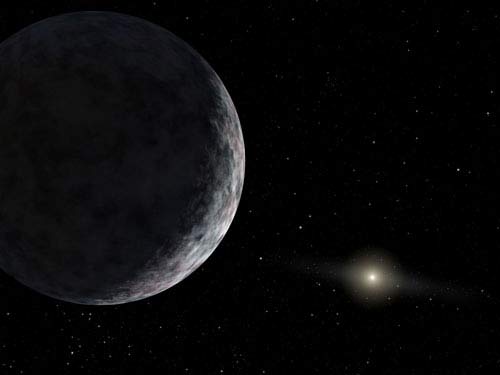Defining 'Planet': Newfound World Forces Action

"The word planet is simply not a scientific word, it is a cultural word."
- Mike Brown, leader of the "10th planet" discovery team
The claim Friday that a 10th planet has been discovered in our solar system has set off a fresh round of debate and international talks aimed at defining the most vexing term in astronomy: the word planet.
A formal proposal could come within a week or two. But some astronomers see no easy resolution.
Now, the guy who stirred the latest dust is trying to snuff the whole debate by repositioning planet as a cultural term that no longer has any scientific meaning.
"Scientists have for the most part not yet realized that the term planet no longer belongs to them," says Caltech's Mike Brown, who led the discovery of the new larger-than-Pluto object.
Brown's new view comes after contemplating six years of mostly fruitless scientific arguments that began when the public became outraged over a rumor that scientists planned to demote Pluto, a rumor rooted in the fact that some astronomers had already stopped calling Pluto a planet by the late 1990s.
"I finally realized the mistake we astronomers had been making all along," Brown told SPACE.com yesterday. "The word planet is simply not a scientific word, it is a cultural word. Once you get over that trap the rest becomes easy."
Breaking space news, the latest updates on rocket launches, skywatching events and more!
The problem
At the heart of the problem is small world that should never have been called the ninth planet when it was found 75 years ago.
Pluto is small, its orbit very noncircular, and it travels 17 degrees outside the main plane of the solar system where the other planets roam. In recent years, several other round worlds at least half as big as Pluto have been found on similar offbeat paths, including two announced last week in addition to 2003 UB313, whose orbit is inclined a whopping 45 degrees.
Most astronomers view all of them, Pluto included, as members of the Kuiper Belt (other terms are used, too, to describe the increasingly complex outer solar system).
The newfound object, temporarily named 2003 UB313, is perhaps 1.5 times the diameter of Pluto and appears to have a similar surface rich in frozen methane. So Brown called it the 10th planet in a hastily arranged teleconference with reporters Friday evening.
NASA, which funded the research, appeared to endorse the label by using Brown's terminology in its official press release.
But yesterday, NASA's Paul Hertz said, "It's not NASA's job to decide what is and what is not a planet." Hertz, chief scientist in the agency's Science Mission Directorate, acknowledged the task falls to the International Astronomical Union (IAU).
"We anticipated there would be a difference of opinions," Hertz said in a telephone interview.
Wildly different, it turns out.
If 2003 UB313 is a planet, one argument goes, then so are those other round things out there. So the new kid on the block would have to go to the back of the line, numerically. It might be No. 12 or No. 24, depending on whose scheme you like.
Proposal soon?
Efforts to craft an official definition have dragged on for years.
The IAU, responsible for nomenclature of all things beyond Earth, has been mulling a planet definition since at least 1999. An IAU Working Group specifically set up to develop a recommendation has been stalled for the past six months.
But most of the dozen members in the group were "exchanging a lot of email this weekend," said Alan Stern of the Southwest Research Institute, who is on the committee.
The members have said they "want to get something done, pronto," Stern told SPACE.com. He said it's possible a proposal could be finalized in a week or two and made public. Still, group members have clearly different ideas in mind.
A synopsis of Stern's thinking:
A planet is a body that directly orbits a star, is large enough to be round because of self gravity, and is not so large that it triggers nuclear fusion in its interior.
"I think there's a consensus moving in this direction," Stern said.
The actual definition will, at least, be more complex than that. Stern favors calling the smaller objects dwarf planets, for example. Other astronomers prefer the term minor planet. Another term bandied about is Kuiper Belt planets. Some don't like the idea of applying the planet label at all.
Let there be 8
Brian Marsden, who is also on the IAU Working Group and who runs the Minor Planet Center where data on objects like these end up, says a simple definition like Stern's makes sense from a theoretical point of view.
If adopted, the wording would bring our solar system's tally of known planets to about two dozen, Marsden said.
| A Revolution A swarm of small worlds discovered in recent years is remaking our view of the solar system, astronomers agree. Pluto, once an oddball, is now thought to be one of many round objects out there. "It's really a revolution," says Alan Stern of the Southwest Research Institute. "We are finding out just how quaint our view of the solar system was." Improved technology promises more discoveries. Some astronomers won't be surprised if something as big as Mars, or even Earth, is found way out there but still bound to the Sun. So far, only a fraction of objects thought to be in the Kuiper Belt, beyond Neptune, have been found. Stern, who is managing NASA's New Horizon's mission to Pluto, points out that there is a billion times more space in our solar system beyond the Kuiper Belt compared to inside that region. "Hold onto your hat," he said. "It's just going to get more bizarre." -- Robert Roy Britt | A Revolution A swarm of small worlds discovered in recent years is remaking our view of the solar system, astronomers agree. Pluto, once an oddball, is now thought to be one of many round objects out there. "It's really a revolution," says Alan Stern of the Southwest Research Institute. "We are finding out just how quaint our view of the solar system was." Improved technology promises more discoveries. Some astronomers won't be surprised if something as big as Mars, or even Earth, is found way out there but still bound to the Sun. So far, only a fraction of objects thought to be in the Kuiper Belt, beyond Neptune, have been found. Stern, who is managing NASA's New Horizon's mission to Pluto, points out that there is a billion times more space in our solar system beyond the Kuiper Belt compared to inside that region. "Hold onto your hat," he said. "It's just going to get more bizarre." -- Robert Roy Britt | A Revolution | A swarm of small worlds discovered in recent years is remaking our view of the solar system, astronomers agree. Pluto, once an oddball, is now thought to be one of many round objects out there. "It's really a revolution," says Alan Stern of the Southwest Research Institute. "We are finding out just how quaint our view of the solar system was." Improved technology promises more discoveries. Some astronomers won't be surprised if something as big as Mars, or even Earth, is found way out there but still bound to the Sun. So far, only a fraction of objects thought to be in the Kuiper Belt, beyond Neptune, have been found. Stern, who is managing NASA's New Horizon's mission to Pluto, points out that there is a billion times more space in our solar system beyond the Kuiper Belt compared to inside that region. "Hold onto your hat," he said. "It's just going to get more bizarre." -- Robert Roy Britt | Row 0 - Cell 4 |
| A Revolution A swarm of small worlds discovered in recent years is remaking our view of the solar system, astronomers agree. Pluto, once an oddball, is now thought to be one of many round objects out there. "It's really a revolution," says Alan Stern of the Southwest Research Institute. "We are finding out just how quaint our view of the solar system was." Improved technology promises more discoveries. Some astronomers won't be surprised if something as big as Mars, or even Earth, is found way out there but still bound to the Sun. So far, only a fraction of objects thought to be in the Kuiper Belt, beyond Neptune, have been found. Stern, who is managing NASA's New Horizon's mission to Pluto, points out that there is a billion times more space in our solar system beyond the Kuiper Belt compared to inside that region. "Hold onto your hat," he said. "It's just going to get more bizarre." -- Robert Roy Britt | A Revolution | A swarm of small worlds discovered in recent years is remaking our view of the solar system, astronomers agree. Pluto, once an oddball, is now thought to be one of many round objects out there. "It's really a revolution," says Alan Stern of the Southwest Research Institute. "We are finding out just how quaint our view of the solar system was." Improved technology promises more discoveries. Some astronomers won't be surprised if something as big as Mars, or even Earth, is found way out there but still bound to the Sun. So far, only a fraction of objects thought to be in the Kuiper Belt, beyond Neptune, have been found. Stern, who is managing NASA's New Horizon's mission to Pluto, points out that there is a billion times more space in our solar system beyond the Kuiper Belt compared to inside that region. "Hold onto your hat," he said. "It's just going to get more bizarre." -- Robert Roy Britt | Row 1 - Cell 3 | |
| A Revolution | ||||
A swarm of small worlds discovered in recent years is remaking our view of the solar system, astronomers agree. Pluto, once an oddball, is now thought to be one of many round objects out there. "It's really a revolution," says Alan Stern of the Southwest Research Institute. "We are finding out just how quaint our view of the solar system was." Improved technology promises more discoveries. Some astronomers won't be surprised if something as big as Mars, or even Earth, is found way out there but still bound to the Sun. So far, only a fraction of objects thought to be in the Kuiper Belt, beyond Neptune, have been found. Stern, who is managing NASA's New Horizon's mission to Pluto, points out that there is a billion times more space in our solar system beyond the Kuiper Belt compared to inside that region. "Hold onto your hat," he said. "It's just going to get more bizarre." -- Robert Roy Britt | ||||
| Row 4 - Cell 0 |
But practically speaking, Marsden, who expects it will take "somewhat more than a week or two to come up with a policy," prefers another approach.
"The only sensible solution is to accept that the solar system contains the eight planets known a century or so ago," Marsden said via email, "and to add new members only if they are larger than, say, Mars -- or maybe even the Earth."
(Stern and others contend that such large worlds indeed await discovery.)
The discovery of 2003 UB313 presents "the best chance to resolve the problem," Marsden said. "I doubt that all astronomers will be happy with the outcome, but I would hope that what is decided is enough of a compromise that most of them are."
Forget science
Mike Brown yesterday attempted to shift the whole debate away from science.
In Brown's mind -- and he admits to changing it recently -- Pluto is too enshrined in our culture, from place mats to postage stamps, to strip it of planethood.
"Some astronomers have rather desperately attempted to concoct solutions which keep Pluto a planet, but none of these are at all satisfactory, as they also require calling dozens of other objects planets," Brown wrote on his web site this week. "While people are perhaps prepared to go from nine to 10 planets when something previously unknown is discovered, it seems unlikely that many people would be happy if astronomers suddenly said, 'we just decided, in fact, that there are 23 planets, and we decided to let you know right now.'"
Brown's team is taking a stand.
"We declare that the new object, with a size larger than Pluto, is indeed a planet," Brown wrote. "A cultural planet, a historical planet. I will not argue that it is a scientific planet, because there is no good scientific definition which fits our solar system and our culture, and I have decided to let culture win this one."
He advises the public to "ignore the distracting debates" of the scientists.
It seems clear the IAU Working Group plans to ignore Brown, at least insofar as they expect to forge a scientific definition.
Yet no matter what the group comes up with, you can bank on at least one more year of debate. For a definition to be made official, it must be voted on at an IAU General Assembly meeting. The next one is in Prague in August, 2006.
- The Solar System that Neptune Built
- Crazy Names: The Solar System's Nomenclature Wars
- Large Planets Lack Definition, Too

Rob has been producing internet content since the mid-1990s. He was a writer, editor and Director of Site Operations at Space.com starting in 1999. He served as Managing Editor of LiveScience since its launch in 2004. He then oversaw news operations for the Space.com's then-parent company TechMediaNetwork's growing suite of technology, science and business news sites. Prior to joining the company, Rob was an editor at The Star-Ledger in New Jersey. He has a journalism degree from Humboldt State University in California, is an author and also writes for Medium.
